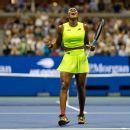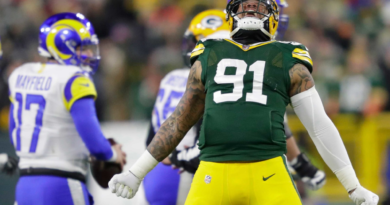Coco Gauff vs. Aryna Sabalenka: Who will win the title?
American Coco Gauff has her chance at her first Grand Slam title in front of a home crowd, while Aryna Sabalenka — the soon-to-be new world No. 1 — will look to win her second major of the year. Who will win? We asked our experts:
What can Gauff do to defeat Sabalenka?
Pam Shriver: Gauff can beat Sabalenka by playing strong defense and making Sabalenka hit extra balls. Gauff’s forehand needs to be able to withstand the extreme power of Sabalenka that will target Gauff’s forehand side more than the backhand. Gauff’s serve needs to get a free point per service game or even more. Gauff needs to orchestrate the crowd support to help her at times, and continue to realize she can win a major final even without her A-game.
Cliff Drysdale: Gauff needs to continue to play defensively, using her lightning speed, but will need to be more aggressive than in her previous two matches to avoid having Sabalenka dictate totally.
Alexandra Stevenson: Gauff has to keep the same practice tactics with her forehand. Her speed seems to always be there.
It’s significant to understand what Brad Gilbert has done for Gauff with his old-school coaching. He doesn’t use the new analytics. He uses his eyes. He’s explained to her what ugly tennis really is — and how you can win with it. She will have a new game plan for Sabalenka. Keep her movement and lift that forehand, so that Sabalenka can’t hit into her far, far western grip. If she brings her focus, forehand and movement — she should be in a good position to win. But don’t forget the serve. She’s got to make a high percentage of first serves.
Rennae Stubbs: Use her speed to get one more ball back. Use her forehand to go high to the Sabalenka forehand, but she must hit it with depth.
Alyssa Roenigk: Sabalenka essentially answered this question for us in Thursday’s news conference after her semifinal win over Madison Keys. To be effective against the hard-hitting 25-year-old, Gauff needs to continue to serve well, utilize her speed, play loose and approach the match like she has nothing to lose. “She’s hungry. And she knows that the crowd is going to support her,” Sabalenka said of Gauff. “That’s what makes her a really difficult opponent in this final.”
Bill Connelly: This has been an incredibly even series to date — Gauff has won three of their five matches and seven of 13 sets, and two of the matches have gone to a third-set tiebreaker — and within them the script for Gauff has been laid out pretty clearly.
In her three wins, she landed at least 64% of her first serves, and in her two losses, she landed 63% (a third-set tiebreaker loss in 2020) and 57% (a straight-set loss this year at Indian Wells). Plus, in two of her three wins, she won at least 57% of Sabalenka’s second-serve points.
This all makes sense, of course: If Sabalenka is landing her big first serve, something she’s done better in 2023, you either have to match her with some easier service points of your own, or you have to pounce on every second serve she gives you.
D’Arcy Maine: Everything the others have said here is exactly right — Gauff’s serve, and how she returns Sabalenka’s serve, could be the keys to winning this match. She will need to bring everything she has to this final in order to hold off Sabalenka, but as Gauff certainly saw Thursday night, Sabalenka was bageled in the opening set against Keys. How did Keys do it? By seizing on Sabalenka’s errors, hitting a seemingly never-ending barrage of winners and riding the momentum and energy from the crowd. Of course, Keys was unable to withhold Sabalenka’s incredible comeback, but the match, and Keys’ dominant first set, could provide some clues for Gauff and her team.
What can Sabalenka do to defeat Gauff?
Shriver: Sabalenka has the extreme power to target Gauff’s forehand and disrupt the recently more confident forehand of Gauff, yet as we saw in the semis versus Karolina Muchova, Gauff can still break down in big moments.
Sabalenka can’t panic when Gauff gets one, two or three extra balls in play. The Belarusian needs to walk out for the final at Ashe Stadium, accepting that the crowd will be 99 percent with Coco Gauff, and show very little emotion. Sabalenka might want to watch the last six games of Bianca Andreescu‘s final win over Serena Williams in 2019 and Ajla Tomljanovic‘s three-set win last year over Williams in Williams’ final match to see two examples of non-American women winning on Ashe with an American as the heavy crowd favorite.
Sabalenka has a strong team behind her, and can use their energy and support to help block out the disparity of crowd support. She should remember how she won the Australian Open final this year by playing clutch power tennis, and believe that if she did it once in a major final, she can do it again.
Drysdale: Sabalenka needs only to dance with who she brought to this party. Use her power groundstrokes following a power serve.
Stevenson: Sabalenka has a lot to think about. Watch her serve mechanics. It was up and down against Keys. And she’s holding in mental pressure about becoming No. 1. To her, she’s supposed to win. Sabalenka has to cover the court — and use her newfound net game to unbalance Gauff.
Stubbs: Hit through Gauff’s forehand. Sabalenka can hit the ball flat enough to Gauff’s forehand to get a short ball, then she can go to the open court.
Luke Jensen: Hit winners past the fastest player in women’s tennis.
Roenigk: She’s not going to beat her by playing the way she did against Keys. If Sabalenka comes out flat and bagels the opening set like she did Thursday night, Gauff will not let her back into the match. Gauff finally has the one thing that’s been missing in big moments: belief she can win. If Sabalenka wants a second major title, she needs to make Gauff question that belief, and do it early. Attack her forehand, shorten points and force her into mistakes.
Connelly: When you’re the (soon-to-be) No. 1 player in the world, typically the answer to “How do you win?” is: “Play your game.” Her 6-4, 6-0 win over Gauff at Indian Wells, the only genuinely resounding win either has had in this series, was a Sabalenka master class: She hit aces on 12% of her serves, landed 73% of her first serves and never double-faulted.
Meanwhile, she won more first-serve return points (43%) than she ever has against Gauff. Granted, Gauff was in a bit of a “can’t win against top-10 players” funk at the time — she lost seven of eight between October and May — and will almost certainly play better. But when Sabalenka is landing the big first serve and hitting big in general, she’s the favorite against virtually anyone, even someone as good at defending as Gauff.
Maine: I’m no psychologist, but I have to think Sabalenka will enter this match with more confidence than ever after that improbable come-from-way-behind win over Keys. That self-belief and knowing the match isn’t over until the very last point, combined with her experience from winning at the Australian Open in January, will all help her in terms of emotionally handling the final. As Alyssa pointed out, she will need to come out ready to play, and not flat like she did on Thursday. But if she does that, she certainly has more than a decent shot of securing her second major title.
Who will win?
Drysdale: Sabalenka, in three sets.
Stevenson: I’m sticking with Gauff — even though choosing a woman in today’s field requires definite consideration of mental and physical ability on the day of match. Unlike the other women players, Gauff doesn’t put pressure on herself. She has shown she can change things up and get out of trouble.
Stubbs: Sabalenka. Her power will be too much for Gauff, and her experience will be the difference-maker.
Jensen: Gauff in straight sets. [New coach] Brad Gilbert has Gauff understanding her tactical identity and Gauff is in a destiny mindset … a winning combo!
Roenigk: This is the summer of Gauff. Sabalenka might be the No. 1 player in the world come Monday, but Gauff is on an 11-match win streak, has already earned two titles this summer and has more hard-court wins than any woman in the world this year. Let’s face it: She’s on a collision course with destiny. Gauff wasn’t meant to win her first Grand Slam at Roland Garros. She was always meant to do it in New York. If you believe in that sort of thing.
Connelly: Because I’m boring, I basically always pick the favorite. But there’s barely a favorite! Caesars only gives Sabalenka a slight edge, and Tennis Abstract gives her a 51% chance of winning. Factor in Gauff’s slight overall advantage in the series, and this is a virtual toss-up.
That makes me look for vibes, and Gauff’s are off the charts at the moment. She’s won 17 of 18 matches since Wimbledon, and five were against top-10 players. She’s dropping anime references in post-match interviews. She’s got the crowd in the palm of her hand. She’s beaten the French Open champ (Iga Swiatek) and the Wimbledon champ (Marketa Vondrousova). She’s beaten the French Open finalist (Karolina Muchova) twice. She’s dropped a total of 11 games in the last two rounds.
Frankly, she’s been the best player in the world over the past two months. There would be nothing surprising about a Sabalenka win, but give me Gauff.
Maine: This match has the makings of an instant classic between two of the best in the game right now, and what I believe most strongly is that it will be a competitive match filled with drama for all the right reasons. There are a million arguments to be made for both players but I’m going with Coco Gauff. With this New York crowd and having played so well on the hard court all summer long, this just feels like it’s her time to win her first Slam.



